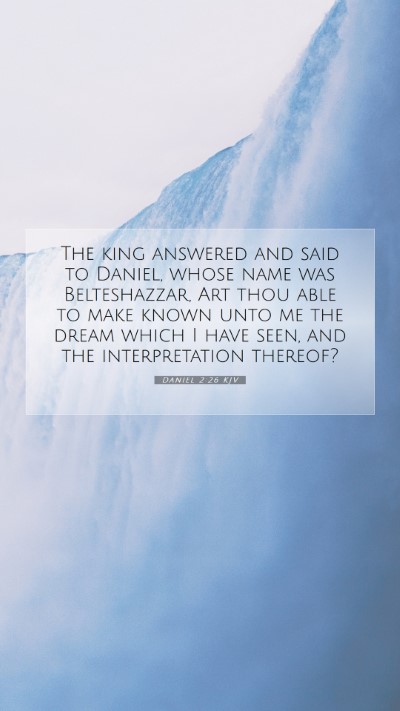Bible Verse Meaning and Interpretation of Daniel 2:26
Daniel 2:26 states: "The king answered and said to Daniel, whose name was Belteshazzar, 'Are you able to make known to me the dream that I have seen and its interpretation?'" This verse occurs within a crucial narrative in the Book of Daniel, where the prophet is called to interpret King Nebuchadnezzar's troubling dream. The significance of this verse can be understood through various public domain commentaries, which shed light on its meaning, context, and applications.
Context and Setting
The context of Daniel 2 is set in Babylon, where King Nebuchadnezzar had a disturbing dream that no one could interpret. This situation reflects the larger theme of divine wisdom versus human ignorance. Daniel is portrayed as a man of God endowed with extraordinary insight, making him the only one capable of providing the answer to the king's desperate inquiry.
Commentary Insights:
- Matthew Henry: Emphasizes that the king's question highlights the limitations of worldly wisdom and the power of God in revealing hidden things.
- Albert Barnes: Notes the significance of Daniel's Babylonian name, Belteshazzar, which symbolizes his connection to the pagan culture, yet he remains faithful to God’s revelation.
- Adam Clarke: Observes the dread and anxiety of Nebuchadnezzar, which underscores the importance of divine revelation in guiding kings and nations.
Understanding the Characters
In this verse, Daniel is introduced to the king with his Babylonian name, indicating the blend of cultures. The king's reliance on Daniel underscores the prophetic role that Daniel plays, serving as a bridge between divine wisdom and earthly rulers.
Interpretation of the Dream
The dream in question represents God’s plan for kingdoms and serves as a warning and guidance for the king. Daniel's ability to interpret the dream signifies the true power of God in revealing future events, contrasting sharply with the failed attempts of the Babylonian magicians.
Theological Implications
This passage illustrates several profound theological truths:
- Divine Sovereignty: God's control over earthly kingdoms is a recurring theme in the Book of Daniel.
- The Role of Prophets: Daniel represents the faithful remnant through whom God communicates truths to the world.
- The Nature of Revelations: It emphasizes that true revelations come from God alone, challenging the wisdom of worldly systems.
Applications for Today
Daniel 2:26 encourages us to seek divine wisdom in all matters of our lives, understanding that true clarity comes from God. This encourages believers to rely on prayerful study of Scripture as a means of receiving direction and insight.
Bible Study Insights
For those engaged in Bible study or online Bible study environments, this verse serves as a case study on the significance of prophecy and divine interpretation. It raises questions on how we discern God's voice amidst competing perspectives in our time.
Cross References
This verse can be cross-referenced with:
- Isaiah 47:13: Similar themes of the failure of astrologers and wise men.
- 1 Corinthians 1:19-20: The wisdom of the world compared to God’s wisdom.
- James 1:5: Encouragement to seek wisdom from God.
Conclusion
In conclusion, Daniel 2:26 serves as a powerful testimony to the profound truths of God's sovereignty, the role of prophets, and the nature of divine revelation. Understanding this verse not only contributes to broader Bible verse meanings but also enriches our Bible study insights as we apply these truths to our contemporary lives.


